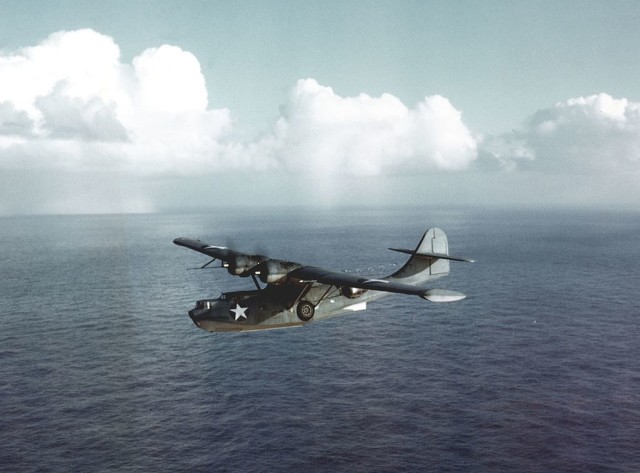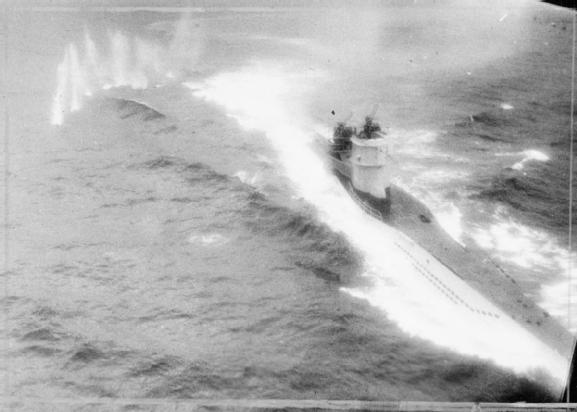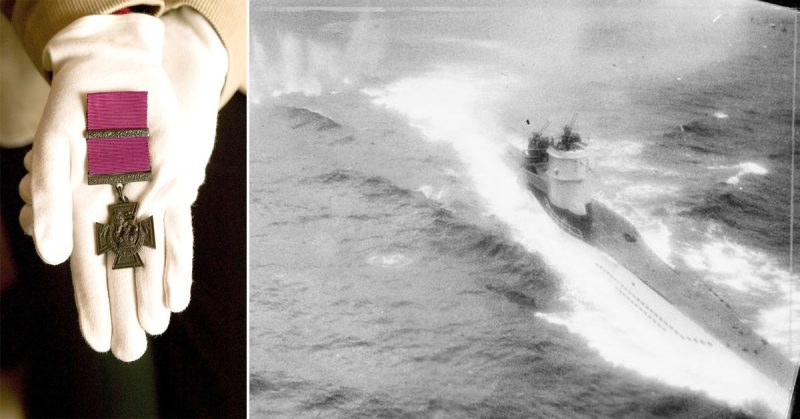For leaders in combat, there exists a strange paradox, where they are to order their men towards very possibly death while simultaneously being inexplicably concerned for their welfare. Quite often, balancing such a dichotomy will come down to the small unit leader and such was the case of RAF Pilot John Cruickshank.
In full knowledge of the damage and fire he and his crew were about to receive, he took a second pass on a German U-boat sinking it at great cost to himself and his aircrew. And then with the mission accomplished, he instantly switched to the protectorate of his men despite having received 72 individual shrapnel wounds in the assault. He fought through the pain to ensure his crew made it home safely and when he arrived he had accomplished a feat that would earn him the Victoria Cross.
He would survive that day and is in fact still around at the age of 95 as the last surviving holder of the Royal Air Force Victoria Cross.
The Flying Boat
John Cruickshank was born on May 20th, 1920 in Aberdeen Scotland. Initially setting out on a career in banking he was apprenticed to the Commercial Bank in Edinburgh before the War. But war often changes the career paths of many men and Cruickshank wouldn’t be any different. He had originally joined the Royal Artillery in May 1939 where he served until 1941. He then transferred to the Royal Air Force and participated in flight training in Canada and the United States.
After picking up his wings, he was assigned to No. 210 Squadron in March of 1943. Here he would pilot the famous Consolidated PBY Catalina flying boat that played such a pivotal part in the battle against German U-boats. Used by the Americans, Royal Air Force, and Canadian Air Force, these maritime aircraft would see action in every theatre of war.

Cruickshank was based out of Sullom Voe in the Shetland Islands and would spend a considerable amount of time patrolling the waters of the Norwegian Sea. The mission was a simple game of cat and mouse as the planes would take to the skies on the search for German U-boats attempting to break out into the Atlantic or disrupt shipping north of England. Catching a surfaced U-boat wasn’t a simple or safe task, but one every flying boat pilot hoped to experience. And one fateful day in 1944, Cruickshank would have an encounter which would lead to his special place in the Battle of the Atlantic.
Air to Sea Attack
On July 17th, 1944, Cruickshank took off from Sullom Voe in his Catalina flying boat headed for the Norwegian Sea where they were to provide a lookout for the British fleet operating in the area. It was in the performance of this mission that Cruickshank and his flying boat caught a German Type VIIC U-boat on the surface of the water.
At this point in the war, the German U-boats had adapted to the aerial threat posed by the RAF and had outfitted with anti-aircraft guns for that dreaded moment when they were caught on the surface. And while the element of a surprise aerial attack often gave the advantage to the aircraft, the nature of making a depth charge run on a U-boat meant that the aircraft were at great risk once the sub crew got a bead on them.

Cruickshank came in for a pass while maintaining a relative element of surprise when the depth charges failed to release on the first run. Knowing now that the Germans were on guard and the element of surprise had been lost, Cruickshank decided to come in for a second run. Unfortunately, on this occasion, the flak fire had been deadly accurate and the flying boat was riddled with shrapnel and explosions.
The navigator had been killed, 4 other crew members injured, and Cruickshank himself had received 72 separate shrapnel wounds to his chest, lungs, and legs. Yet, bleeding profusely and in a cockpit filled with smoke, he zeroed in on the sub and straddled the U-boat perfectly with depth charges.
The U-boat stood little chance in the face of such a perfect deployment of the anti-submarine weapons and was instantly sunk with all 52 crew on board. Initial reports were that it was U-347 that was sunk, but post-war accounting revealed it was, in fact, U-361 which had taken part in 6 separate wolf packs in 1944 before being sunk. The mission was accomplished, the signals for a return trip had been sent home, and then Cruickshank collapsed from a loss of blood.
A Long Flight Home
Once he fell out of consciousness, the second and the much more inexperienced pilot took over the controls in an attempt to nurse the wounded plane home. Cruickshank would temporarily recover and insisted on returning to the controls to ensure the less experienced pilot could take care of the plane and men.
Only then would he consent to medical treatment for his extensive wounds. Over the next 5 and a half hours on the trip home, Cruickshank would continue to slip in and out of consciousness due to the loss of blood and each time he awoke he immediately took to looking after the plane and his men.
Eventually, they arrived back to their base when Cruickshank awoke to realize the light and sea conditions would prove extremely hazardous for the younger pilot to make. He took to the controls and insisted that the plane circle for another hour to ensure the craft could land without undue risk to the crew.
With his assistance, the flying boat was landed and he taxied the plane to a beach where it could be easily salvaged. When the medical officer arrived on the plane and saw Cruickshank’s condition, he immediately ordered a blood transfusion before he could survive the trip to a hospital.
Due to his injuries, this would be the last command flight for Cruickshank, but for his gallantry and resolve on this fateful day, John Cruickshank was awarded the Victoria Cross.
